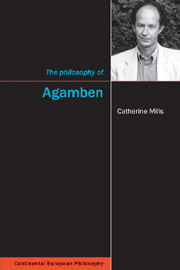Book contents
- Frontmatter
- Contents
- Acknowledgements
- Abbreviations
- Introduction
- 1 Metaphysics: negativity, potentiality and death
- 2 Aesthetics: language, representation and the object
- 3 Politics: biopolitics, sovereignty and nihilism
- 4 Ethics: testimony, responsibility and the witness
- 5 Messianism: time, happiness and completed humanity
- Conclusion
- Notes
- Chronology of major works
- Bibliography
- Index
1 - Metaphysics: negativity, potentiality and death
- Frontmatter
- Contents
- Acknowledgements
- Abbreviations
- Introduction
- 1 Metaphysics: negativity, potentiality and death
- 2 Aesthetics: language, representation and the object
- 3 Politics: biopolitics, sovereignty and nihilism
- 4 Ethics: testimony, responsibility and the witness
- 5 Messianism: time, happiness and completed humanity
- Conclusion
- Notes
- Chronology of major works
- Bibliography
- Index
Summary
Some of the most intractable problems that Agamben addresses in his work derive from his engagement with the history of metaphysics in Western philosophy, and particularly the tendency that he diagnoses in metaphysical thought to presuppose and posit a foundation for being and language in negativity. This position is elaborated most explicitly in the complex text, Language and Death, where Agamben sets himself the project of surpassing this metaphysical tendency towards negative foundation, which he argues first requires an examination of the true meaning of the terms “Da” and “Diese” central to the thought of the German philosophers Martin Heidegger and G. W. F. Hegel respectively. Throughout this book, he pursues the logic of negative foundation as it appears throughout Western metaphysical thought, particularly in the figurations of language as constituted by or founded in the ineffable or unspeakable. The task of surpassing metaphysics leads Agamben to posit the necessity of an experiment in language, in which what is at stake in language is not the ineffable that must necessarily be suppressed in speech, but the very event of language itself, the taking place of language prior to signification and meaning.
But the engagement with Heidegger and Hegel in Language and Death not only provides an important philosophical counterpoint to Agamben's theory of language; it also ties in with his reflections on the question of potentiality and actuality taken from Aristotle. In this chapter I show how Agamben's retheorization of the relation of potentiality and actuality is a necessary counterpart to the attempt to surpass metaphysics.
- Type
- Chapter
- Information
- The Philosophy of Agamben , pp. 9 - 34Publisher: Acumen PublishingPrint publication year: 2008



